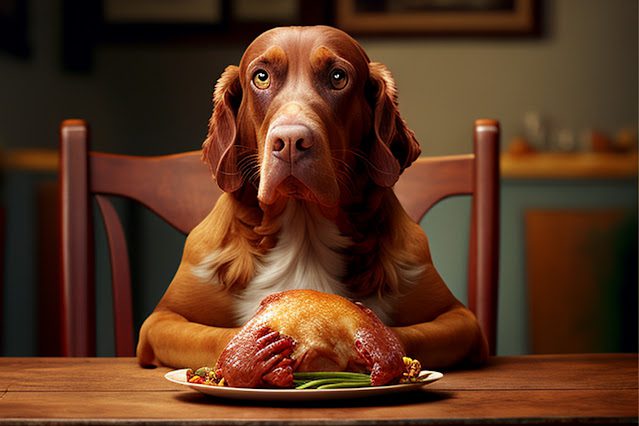Dogs can eat turkey as part of a balanced diet, but it’s important to make sure that the turkey is cooked and prepared properly before giving it to your dog. Raw or undercooked turkey can contain harmful bacteria that can cause food poisoning in dogs, just as it can in humans. It’s also important to remove the skin and bones from the turkey before giving it to your dog, as these can be difficult for them to digest and may cause gastrointestinal issues. Additionally, you should avoid giving your dog large amounts of turkey, as it can be high in fat and may cause weight gain. It’s best to serve turkey as a occasional treat or in small amounts as part of a balanced meal. If you have any concerns about feeding your dog turkey, it’s always best to consult with your veterinarian.
Turkey can be a healthy and tasty treat for dogs, but it’s important to prepare it properly before giving it to your furry friend. Here are some tips for feeding your dog turkey:
Make sure the turkey is cooked thoroughly: Raw or undercooked turkey can contain harmful bacteria that can cause food poisoning in dogs.
Remove the skin and bones: The skin and bones of the turkey can be difficult for dogs to digest and may cause gastrointestinal issues.
Limit the amount of turkey you give your dog: Turkey can be high in fat, so it’s best to serve it as an occasional treat or in small amounts as part of a balanced meal.
Consult with your veterinarian: If you have any concerns about feeding your dog turkey, it’s always best to consult with your veterinarian for guidance.
Overall, turkey can be a nutritious and delicious addition to your dog’s diet, as long as it’s prepared and served safely. Just make sure to follow these tips to keep your dog happy and healthy.
Here are a few more things to consider when feeding your dog turkey:
Choose white meat over dark meat: White meat turkey is leaner and has less fat than dark meat, so it’s a better choice for your dog.
Avoid seasoning or adding any additional ingredients: Dogs have different nutritional needs than humans, and some seasonings and ingredients that are safe for humans can be toxic for dogs. It’s best to keep things simple and just give your dog plain, unseasoned turkey.
Monitor your dog for any adverse reactions: As with any new food, it’s important to watch your dog closely after giving them turkey to make sure they don’t have any adverse reactions. Symptoms to watch for include vomiting, diarrhea, lethargy, and loss of appetite. If you notice any of these symptoms, stop feeding your dog turkey and consult with your veterinarian.
Keep turkey as a treat, not a main source of nutrition: While turkey can be a healthy and tasty treat for dogs, it shouldn’t be the main source of nutrition in their diet. A balanced diet that includes a variety of high-quality dog food and treats is best for your dog’s overall health.
By following these guidelines, you can safely and responsibly include turkey as a treat in your dog’s diet. As always, if you have any concerns about your dog’s diet, it’s best to consult with a veterinarian for guidance.
